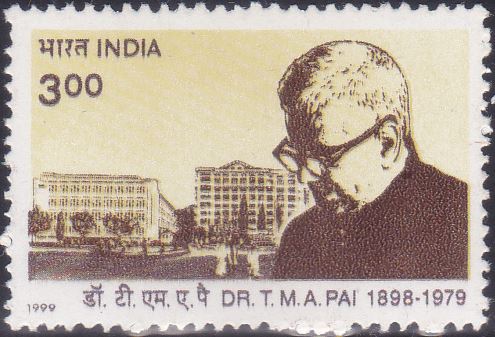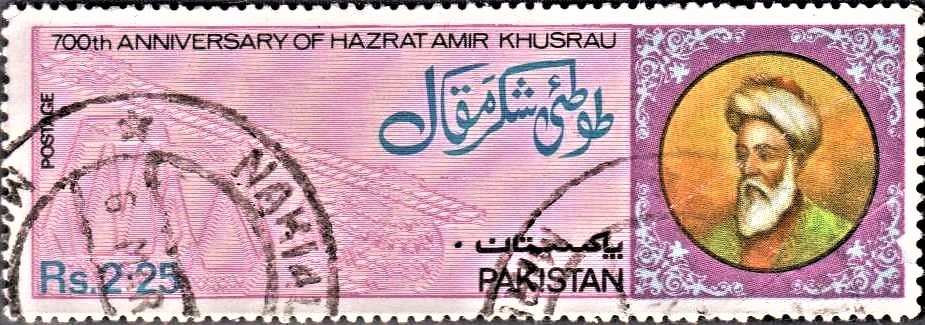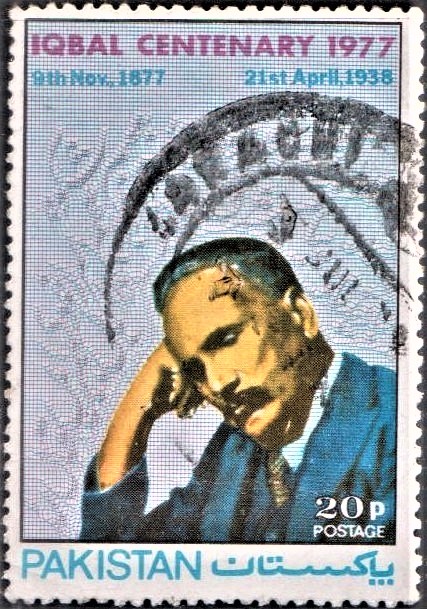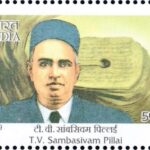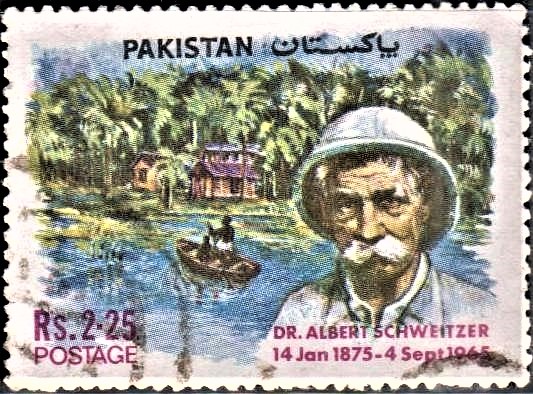
Dr. Albert Schweitzer
A commemorative postage stamp on the Birth Centenary of Albert Schweitzer, an Alsatian theologian, organist, writer, humanitarian, philosopher & physician :
 Issued by Pakistan
Issued by Pakistan
Issued on Jan 14, 1975
Design : Stamp is horizontal in format. Portrait of Dr. Albert Schweitzer appears at the right side of the stamp. In the background a dense forest of Africa is shown with a small hut near the centre and in the foreground a river is shown with a boat being rowed by an African reminiscent of the Journey he took on the river Ogowe to visit an ailing patient in September, 1915. “Pakistan” in English and Urdu appears at the top near the centre in black while the denomination “Rs. 2.25” with the word ‘postage’ underneath appears in the bottom left corner in red. The wordings “Dr. Albert Schweitzer” 14 Jan 1875 – 4 Sept 1965, appear in red colour across the lower portion of the portrait.
Type : Stamp, Postal Used
Denomination : Rs. 2.25
Colour : Yellow, Red, Blue and Black
Size of Stamp : 44.50 x 32.50 m.m.
Size of Print : 41.50 x 29.50 m.m.
Perforation gauge : 13 x 13 (C)
Quantity printed : 5,00,000
Number of stamps in each sheet : 50 (fifty)
Process of printing : Litho Offset
Printers : The Pakistan Security Printing Corporation Ltd., Karachi
Name : Albert Schweitzer
Born on Jan 14, 1875 at Kaysersberg, Alsace–Lorraine, Germany [now Haut–Rhin, France]
Died on Sep 4, 1965 at Lambaréné, Gabon
About :
- Dr. Albert Schweitzer was a musician, medical missionary and a christian philosopher who became a world renowned figure through his outstanding humanitarian work for the uplift of the people of French Equatorial Africa. A musician of repute, he was organist to the Bach Society of Paris, and attained wide reputation in Europe with the publication of his outstanding works which included “The Quest of the Historical Jesus”, “On the Edge of the Primeval Forest”, “From My African Note–book”, “Out of My Life and Thought”, and two volumes of his treatise on the Philosophy of Civilisation.
- He was born on 14th January, 1875 at Gunsbach to Swiss parents. He was educated at the Universities of Paris, Berlin and Strasbourg and became curate of the church of St. Nicholaus at Strasbourg. Later on he was appointed as the principal of St. Thomas College, Strasbourg. It was at this stage that Albert Schweitzer decided to study medicine and to go to Africa to aid the sick there. In 1912 he married Helene Bresslau. The following year he received the degree of doctor of medicine and left for Africa to establish a hospital on the grounds of the Lambarene Station of the Paris Missionary Society in Gabon. At Lambarene where he remained for the greater part of his life, he founded, equipped and maintained a hospital, returning to Europe periodically to give organ recitals in order to raise funds for the hospital.
- With the outbreak of World War I, the couple were declared “enemy aliens” as German nationals and were interned from August to November, 1914. In September 1915, he took a journey on the Ogowe River to visit an ailing patient. In 1917 the Schweitzers were again placed in internment and were released in mid-1918. After years of duty at Lambarene he returned to Europe to see his family. During all this period he continued his writings and received numerous awards from the heads of states.
- Dr. Schweitzer received the Nobel Peace Prize for 1952, and used the award money for the construction of a new village for African victims of leprosy. In his 80th year he received the honorary degree of Doctor of Law from the University of Cambridge and was made an Honorary Member of the British Order of Merit by Queen Elizabeth II.
- Deeply concerned with the threat of nuclear war he appealed for the renunciation of atomic weapons through broadcasts from Oslo. Upon the adoption of the Test Ban Treaty in 1963, he wrote to President Kennedy to hail its passage.
- On September 4, 1965, Albert Schweitzer died at Lambarene.
- Issued by: The Director General, Pakistan Post Office, Karachi.


